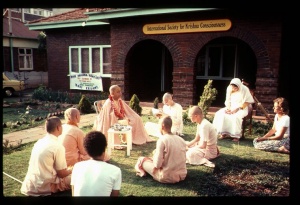CC Madhya 9.29: Difference between revisions
m (1 revision(s)) |
(Vanibot #0054 edit - transform synonyms into clickable links, which search similar occurrences) |
||
| (One intermediate revision by one other user not shown) | |||
| Line 1: | Line 1: | ||
{{ | [[Category:Sri Caitanya-caritamrta - Madhya-lila Chapter 09|C029]] | ||
<div style="float:left">'''[[Sri Caitanya-caritamrta|Śrī Caitanya-caritāmṛta]] - [[CC Madhya|Madhya-līlā]] - [[CC Madhya 9|Chapter 9: Lord Śrī Caitanya Mahāprabhu's Travels to the Holy Places]]'''</div> | |||
<div style="float:right">[[File:Go-previous.png|link=CC Madhya 9.28|Madhya-līlā 9.28]] '''[[CC Madhya 9.28|Madhya-līlā 9.28]] - [[CC Madhya 9.30|Madhya-līlā 9.30]]''' [[File:Go-next.png|link=CC Madhya 9.30|Madhya-līlā 9.30]]</div> | |||
{{CompareVersions|CC|Madhya 9.29|CC 1975|CC 1996}} | |||
{{RandomImage}} | |||
==== TEXT 29 ==== | ==== TEXT 29 ==== | ||
<div | <div class="verse"> | ||
ramante yogino ’nante | :ramante yogino ’nante | ||
satyānande cid-ātmani | :satyānande cid-ātmani | ||
iti rāma-padenāsau | :iti rāma-padenāsau | ||
paraṁ brahmābhidhīyate | :paraṁ brahmābhidhīyate | ||
</div> | </div> | ||
| Line 14: | Line 18: | ||
==== SYNONYMS ==== | ==== SYNONYMS ==== | ||
<div | <div class="synonyms"> | ||
''[//vanipedia.org/wiki/Special:VaniSearch?s=ramante&tab=syno_o&ds=1 ramante]'' — take pleasure; ''[//vanipedia.org/wiki/Special:VaniSearch?s=yoginaḥ&tab=syno_o&ds=1 yoginaḥ]'' — transcendentalists; ''[//vanipedia.org/wiki/Special:VaniSearch?s=anante&tab=syno_o&ds=1 anante]'' — in the unlimited; ''[//vanipedia.org/wiki/Special:VaniSearch?s=satya&tab=syno_o&ds=1 satya]-[//vanipedia.org/wiki/Special:VaniSearch?s=ānande&tab=syno_o&ds=1 ānande]'' — real pleasure; ''[//vanipedia.org/wiki/Special:VaniSearch?s=cit&tab=syno_o&ds=1 cit]-[//vanipedia.org/wiki/Special:VaniSearch?s=ātmani&tab=syno_o&ds=1 ātmani]'' — in spiritual existence; ''[//vanipedia.org/wiki/Special:VaniSearch?s=iti&tab=syno_o&ds=1 iti]'' — thus; ''[//vanipedia.org/wiki/Special:VaniSearch?s=rāma&tab=syno_o&ds=1 rāma]'' — Rāma; ''[//vanipedia.org/wiki/Special:VaniSearch?s=padena&tab=syno_o&ds=1 padena]'' — by the word; ''[//vanipedia.org/wiki/Special:VaniSearch?s=asau&tab=syno_o&ds=1 asau]'' — He; ''[//vanipedia.org/wiki/Special:VaniSearch?s=param&tab=syno_o&ds=1 param]'' — supreme; ''[//vanipedia.org/wiki/Special:VaniSearch?s=brahma&tab=syno_o&ds=1 brahma]'' — truth; ''[//vanipedia.org/wiki/Special:VaniSearch?s=abhidhīyate&tab=syno_o&ds=1 abhidhīyate]'' — is called. | |||
</div> | </div> | ||
| Line 21: | Line 25: | ||
==== TRANSLATION ==== | ==== TRANSLATION ==== | ||
<div | <div class="translation"> | ||
“‘The Supreme Absolute Truth is called Rāma because the transcendentalists take pleasure in the unlimited true pleasure of spiritual existence.’ | “‘The Supreme Absolute Truth is called Rāma because the transcendentalists take pleasure in the unlimited true pleasure of spiritual existence.’ | ||
</div> | </div> | ||
| Line 28: | Line 32: | ||
==== PURPORT ==== | ==== PURPORT ==== | ||
<div | <div class="purport"> | ||
This is the eighth verse of the Śata-nāma-stotra of Lord Rāmacandra, which is found in the Padma Purāṇa. | This is the eighth verse of the ''Śata-nāma-stotra'' of Lord Rāmacandra, which is found in the ''Padma Purāṇa''. | ||
</div> | </div> | ||
__NOTOC__ | |||
<div style="float:right; clear:both;">[[File:Go-previous.png|link=CC Madhya 9.28|Madhya-līlā 9.28]] '''[[CC Madhya 9.28|Madhya-līlā 9.28]] - [[CC Madhya 9.30|Madhya-līlā 9.30]]''' [[File:Go-next.png|link=CC Madhya 9.30|Madhya-līlā 9.30]]</div> | |||
__NOTOC__ | |||
__NOEDITSECTION__ | |||
Latest revision as of 00:07, 20 February 2024
Śrī Caitanya-caritāmṛta - Madhya-līlā - Chapter 9: Lord Śrī Caitanya Mahāprabhu's Travels to the Holy Places

His Divine Grace
A.C. Bhaktivedanta Swami Prabhupada
A.C. Bhaktivedanta Swami Prabhupada
TEXT 29
- ramante yogino ’nante
- satyānande cid-ātmani
- iti rāma-padenāsau
- paraṁ brahmābhidhīyate
SYNONYMS
ramante — take pleasure; yoginaḥ — transcendentalists; anante — in the unlimited; satya-ānande — real pleasure; cit-ātmani — in spiritual existence; iti — thus; rāma — Rāma; padena — by the word; asau — He; param — supreme; brahma — truth; abhidhīyate — is called.
TRANSLATION
“‘The Supreme Absolute Truth is called Rāma because the transcendentalists take pleasure in the unlimited true pleasure of spiritual existence.’
PURPORT
This is the eighth verse of the Śata-nāma-stotra of Lord Rāmacandra, which is found in the Padma Purāṇa.